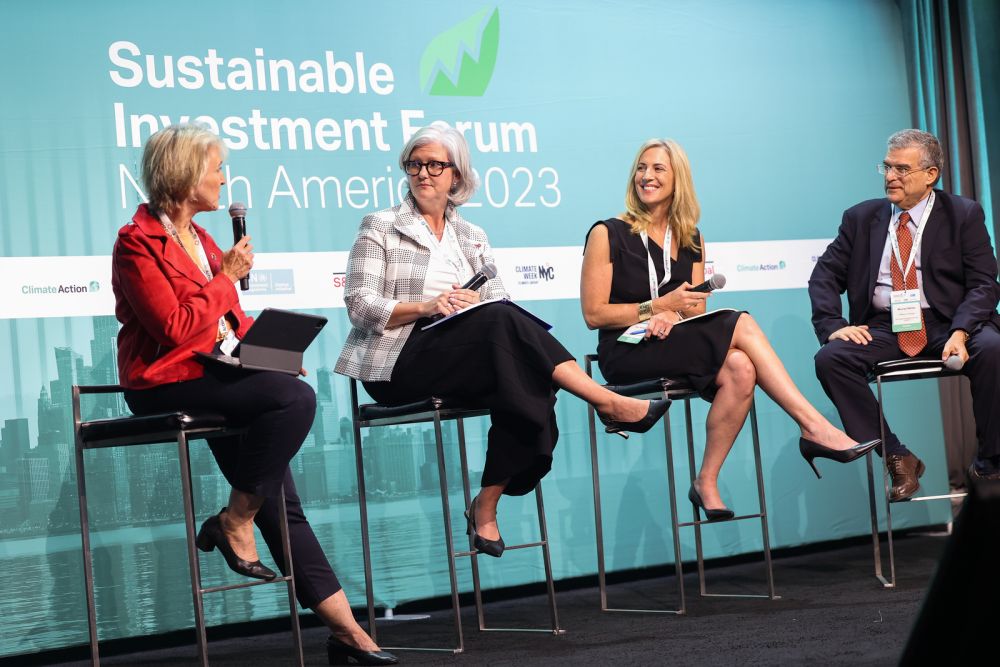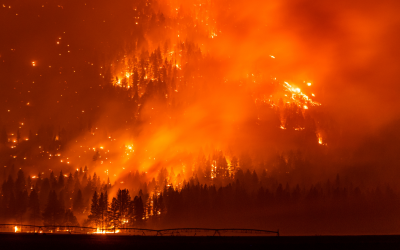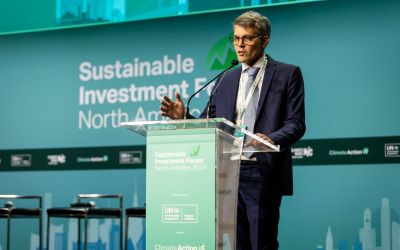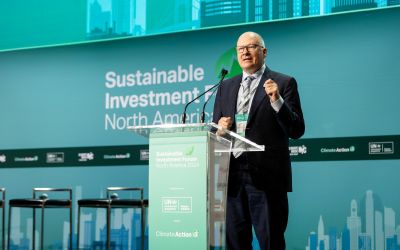Watch the 8th annual Sustainable Investment Forum North America on demand now
Looking back at the highlights of the 8th annual Sustainable Investment Forum North America, led by Climate Action and UNEP FI.

Looking back at the highlights of the 8th annual Sustainable Investment Forum North America, led by Climate Action and UNEP FI.
Climate Action and UNEP FI were delighted to welcome over 500 members of the global sustainable finance community to the 8th annual Sustainable Investment Forum North America last week.
Hosted in New York’s Ziegfeld Ballroom on 19th September alongside the rather disappointing UN General Assembly and during an incredibly hectic Climate Week NYC, the event was described as the ‘must attend’ meeting point for the finance community during the week-long melee of conferences and events.
For those who couldn’t join us in person, or if you missed the livestreamed sessions, all content is available On Demand here.
Elizabeth Maruma Mrema, Deputy Executive Director, UNEP opened with a thought-provoking keynote highlighting that no continent is exempt from suffering the effects of climate change and regions which are most economically vulnerable are bearing the brunt. The preservation of ecosystems and biodiversity is a global responsibility.
The recurring theme throughout the day was the consensus that the global community and economy cannot achieve net zero without being nature positive as well as the agreement that capital mobilisation must happen at greater speed to regions most in need and at threat of climate change. The collaboration between public and private sector finance is pivotal if global net zero targets are to be met.
Given the polarisation and politicisation of ESG in the US, forum attendees and participants were hopeful, that, although there has been some pushback, progress has, and continues to be made. There was resounding agreement that renewable energy sources and increased reliance on distributed energy resources are essential for reducing the industrialised world's vulnerability to geopolitical pressure-tactics and embargos. Much was discussed as to how far the North American region is willing to adopt policies to speed up the switch to renewables. Though the US faces a fragmented policy environment, both at the federal and the state levels.
In the lead-up COP 28 the New York forum has set the scene for many commitments to be realised and actioned as the global sustainable finance community meets once again in Dubai in December.
In the midst of geopolitical crises and a global economic downturn, it was reassuring to hear at the conference how responsible investors continue to play a key role in financing the scale-up and action required to meet UN SDGs and deliver a just and equitable transition. Whilst the energy crisis accelerates the clean energy transition in the developed but not the developing world many questioned whether targets set at COP 27 being will be realised before COP 28 convenes in Dubai in December.
Panellists discussed how measuring the impact on nature, natural, human and social capital is receiving increasing interest from investors who want to mitigate their negative impact on biodiversity by reducing the biodiversity footprint of their investment and financing activities. This rationale extends beyond pure financial performance and into ‘double materiality’ – the idea that investors should consider not only the impact the external environment has on a portfolio, but also the impact a portfolio has on the natural and social capital in the world.
The final panel of the day discussed how investing in climate smart infrastructure and insuring against extreme global weather patterns is a must when responsible investing across assets and portfolios. The war in Ukraine underscores that scaling up investment in climate-smart infrastructure is necessary to ensure energy and food security as we transition to a lower-carbon future. Well-planned green infrastructure projects not only raise potential output growth and enhance resilience but can also help reduce the carbon footprint that comes with economic progress. Greater private sector participation in the planning, construction and operation of infrastructure can help mitigate public sector constraints in funding the green transition.
If you missed us in New York, then make sure you join us at the Innovation Zone and flagship events taking place in Dubai during COP28.
Climate Action Innovation Zone | COP 28 Dubai
The Climate Action Innovation Zone is the place for private public sector collaboration at COP 28






